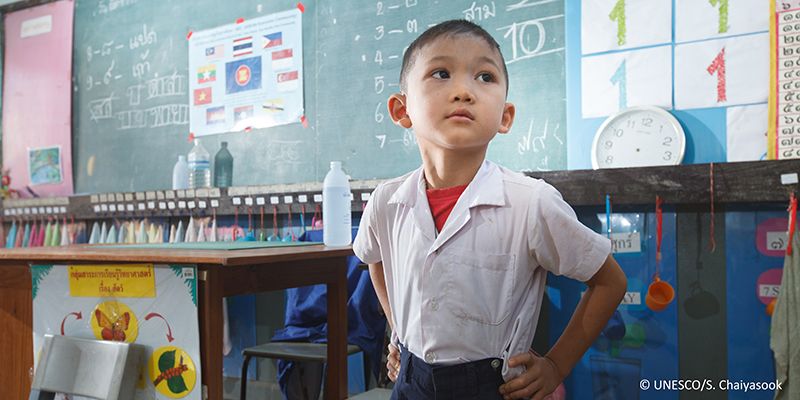PRESS RELEASE: ‘Putrajaya Declaration’ Sets out Actions for Inclusive, Equitable, Innovative Early Childhood Care and Education in Asia-Pacific
PUTRAJAYA, MALAYSIA, 21 JULY 2016: High-level policy-makers from throughout Asia-Pacific have committed to advancing equitable, quality early childhood care and education (ECCE) in the region with the adoption of the Putrajaya Declaration.
The declaration was announced at the conclusion of the Asia-Pacific Regional Policy Forum on Early Childhood Care and Education, which opened here on Tuesday. It includes a nine-point action agenda that will guide Asia-Pacific countries as they seek to achieve Sustainable Development Goal target 4.2: “By 2030 ensure that all girls and boys have access to quality early childhood development, care and pre-primary education so that they are ready for primary education.”
The wide-ranging action plan includes guidelines for more inclusive, integrated and multi-sectoral ECCE policies; improving ECCE quality for all; strengthening infrastructure, increasing government expenditure while forging financing partnerships; monitoring and evaluating progress toward the target; improving data collection and analysis; awareness raising, and developing a regional framework for SDG 4.2.
In his closing remarks, Gwang-Jo Kim, Director of UNESCO Bangkok, the Asia and Pacific Regional Bureau of Education, said the Putrajaya Declaration marks the launching point of what will need to be a joint effort to achieve SDG 4.2 “Although governments have the ultimate obligation to ensure the right of every child to quality early childhood care and education, ECCE must be everyone’s business; all stakeholders at national and regional levels have a shared responsibility and need to actively take part in building inclusive, equitable, sustainable and high-quality ECCE systems,” Mr. Kim said. “We must do all in our power to achieve the Sustainable Development Goals by 2030 for the present and future generations. ECCE is the foundation of lifelong learning and sits at the heart of this process.
“We need partners to turn today’s commitments into tomorrow’s reality.”
Wivina Belmonte, Deputy Regional Director for UNICEF East Asia and the Pacific, said: “When it comes to ECCE, the right of every child is in the interests of every nation.
“We often hear people say, ‘Children are the future’ – and that’s true,” she said. “If we don’t invest in their development in the earliest days and years, we are short changing their future and the future of our respective countries too; so, the right to a fair start in life also means dividends in sustainable development and growth and that’s the transformative power of early childhood.”
Malaysian Deputy Minister of Education Yang Berhormat Dato’ P. Kamalanathan A/L P. Panchanathan addressed the importance of ECCE both for the region and in his own country.
“The success of the Putrajaya Declaration will be the driving force for Asia Pacific countries to move forward towards a more inclusive, equitable and sustainable development of ECCE,” he said. “To us every child is a precious and valuable resource to the nation. We believe in empowering children at a young age for the progress and development of human capital for nation building. It is therefore pertinent that the Putrajaya Declaration spearheads innovations towards inclusivity and quality of early childhood care and education.”
Speaking at a reception for forum delegates on Tuesday, Malaysian Prime Minister Dato' Sri Haji Mohammad Najib bin Tun Haji Abdul Razak asked, “What could be more important than our children? They are our countries’ future. They are the most valuable resource of our nations,” he said. “And I believe that developing a nation and its people begins with early childhood education and development.”
In a keynote to open the second day of the conference, noted ECCE scholar and advocate Professor Sharon Lynn Kagan, co-director of the National Center for Children and Families Teachers College at Columbia University in New York, said that a shift in mindset is needed to realize ECCE's transformative potential.
“We as leaders have the obligation to think big. Without the vision, there will be no new reality for children,” she said. We need to think far, not just about one political term, the next two years, but the next 15 and 20 years. This will take a long time. And we need to think different. We need to think of systems as being composed of programs and of the infrastructure.”
Ministers and vice-ministers overseeing education and other policy-level delegates from 36 countries were joined by representatives from UN agencies, NGOs, bilateral cooperation agencies, intergovernmental organizations and ECCE donors for the three-day forum. More than 600 participants took part in the forum.
Delegates shared innovative practices in areas such as policy, planning, service delivery monitoring and evaluation to reach marginalized children; financing and partnerships to boost ECCE investment; coordination mechanisms to promote children’s holistic development as well as in teaching approaches and human resource development to raise ECCE quality.
UNESCO, UNICEF, the Asia-Pacific Regional Network for Early Childhood (ARNEC) and the Malaysian Ministry of Education organized the forum, with funding support from the the Japanese Ministry of Education, Culture, Sports, Science and Technology; the Ministry of Strategy and Finance of the Republic of Korea, and the Open Society Foundation.
The event was the first regional policy forum to focus specifically on SDG 4.2 since last year's adoption of the Agenda for Sustainable Development.
The forum is supported by financial contributions from the Japanese Ministry of Education, Culture, Sports, Science and Technology; the Ministry of Strategy and Finance of the Republic of Korea, and the Open Society Foundation.
Media Contacts:
UNESCO: Noel Boivin, Media and Communications Officer, email: n.boivin@unesco.org
ARNEC: Silke Friesendorf, Communications Manager, email: silke.f@arnec.net
For more on the forum, please visit: goo.gl/NoxStt Opening day press release: goo.gl/VYb4LF








